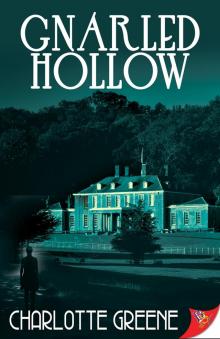- Home
- Charlotte Greene
Gnarled Hollow
Gnarled Hollow Read online
Gnarled Hollow
Unemployed English professor Emily Murray has been given a chance of a lifetime: to work and study inside Gnarled Hollow, the former estate of one of her favorite authors. She doesn’t believe in the supernatural, but by the end of her first day, she knows something is wrong. The house has a disturbing habit of changing dimensions--and nor just physical ones. Rooms go missing, doors close on their own, and time has a strange tendency to disappear. Emily is joined by other scholars, among them the beautiful art historian, Juniper Friend. Together they begin to research the history of the house, refusing to abandon their work despite the appearance of a mysterious, frightening presence. Spurred on by their desire to uncover the mysteries of Gnarled Hollow and its ghostly inhabitant, they’re determined to uncover the truth, even if it means risking their own lives.
Gnarled Hollow
Brought to you by
eBooks from Bold Strokes Books, Inc.
http://www.boldstrokesbooks.com
eBooks are not transferable. They cannot be sold, shared or given away as it is an infringement on the copyright of this work.
Please respect the rights of the author and do not file share.
Gnarled Hollow
© 2018 By Charlotte Greene. All Rights Reserved.
ISBN 13:978-1-63555-236-2
This Electronic Book is published by
Bold Strokes Books, Inc.
P.O. Box 249
Valley Falls, NY 12185
First Edition: September 2018
This is a work of fiction. Names, characters, places, and incidents are the product of the author’s imagination or are used fictitiously. Any resemblance to actual persons, living or dead, business establishments, events, or locales is entirely coincidental.
This book, or parts thereof, may not be reproduced in any form without permission.
Credits
Editor: Shelley Thrasher
Production Design: Susan Ramundo
Cover Design By Sheri ([email protected])
By the Author
Palette for Love
Love in Disaster
Canvas for Love
Pride and Porters
Gnarled Hollow
Dedication
For you, always.
Chapter One
Emily’s sister Marion insisted on giving her the map that morning, and she’d taken it from her with a groan of impatience. Ever since their parents had retired to Costa Rica three years ago, Marion, though younger than her, had fashioned herself into the new “mom” of the family. The map was clearly “mom” behavior, even if, in truth, it was something their real mother would never have offered. Marion produced it, along with a packed lunch for the trip, as if Emily were incapable of stopping somewhere and finding food on her own.
“You never know,” Marion had said. “You might not find anywhere to stop. And anyway, homemade is healthier.”
Now, hours later, Marion’s sandwich in one hand, peering down at the map, she had to quell a flash of resentment. Marion had been right, as usual. Not only had her GPS and phone quit functioning, but she also hadn’t passed a single place suitable for lunch in the last couple of hours. A few minutes ago, she’d simply pulled over on the side of the road, barely off the edge of the pavement.
Having a map, however, was no real help. Emily was hopeless with directions and place names. She’d been driving for the last hour, but the place names along that road on the map were unfamiliar. Surely if she’d passed a town called Persistence, she would have remembered it. Or a river called Sorrow. Or a lake called Lost Hope. Her sister, clearly trying to be helpful, had made little black circles at points along the road where she could turn and save time on her journey, but at this point Emily was less concerned with saving time and more concerned with actually arriving at her destination. She couldn’t even remember the name of that last tiny place she’d driven through. Something with Falls in the name? But that couldn’t be right, as she saw nothing with that in the name on her map, unless she’d somehow managed to drive completely off course.
She peered up and down the road. Maybe she might spot a sign to suggest that she was on the road she thought she was on, but she didn’t. It didn’t help that the road was curved and steep, the woods dense, the trees hiding the horizon in either direction. She sighed. The map was next to useless. She would finish her lunch and keep driving. Something must be ahead of her, and if she didn’t see anything in half an hour, she could always retrace her route. Even she could do that, as she’d been on the same road for at least an hour without turning.
She leaned back on the hood of her car, munching the apple slices her sister had packed. Despite being lost, she had enjoyed the beautiful drive almost from the moment she’d left town this morning. She was unfamiliar with this part of the country. She’d grown up in New Mexico, where the woods, even when thick, were nothing like this. She didn’t recognize the trees here—oaks or elms, maybe. The leaves and branches above her were so dense, they cut off sunlight. Only a soft-green light filtered through, catching motes of pollen and dust as they floated through the trees. The road itself was strangely out of place, foreign in this setting. One season without maintenance and the woods would take it back. Water ran down the hill behind where the car was parked, gushing in a stream nearby. It was marvelous here, almost like a fairy tale.
Her sister was living in New England temporarily with her husband on a military base, and Emily didn’t know another person besides her and her brother-in-law for hundreds of miles. It was a peaceful feeling. No one around here needed anything from her or was counting on her for anything. No one was disappointed in her. Here, in these dense woods, she didn’t need to answer to anyone. Even lost, she felt better than she had in a long time.
As she stuffed the little plastic baggies into the larger paper sack, she heard it: a strange sound—both familiar and unfamiliar—as if she’d forgotten how that sound was made. She froze, cocking her head, her heart rate unaccountably increasing. The sound was coming from the woods.
She turned in that direction, suddenly afraid she would see it, but saw nothing. The landscape remained the same thick wall of trees in all directions. She felt as if she were being watched. Despite the warmth of the day, she shuddered, still peering into the woods. Movement caught the edge of her vision, and she spun toward it, almost cringing as she tensed.
A bicycle finally came into view, making that strange whirling sound she hadn’t been able to recognize. The trees must have caught the sound and thrown it somehow, as it had seemed to come from the forest rather than the road, but there it was. The cyclist spotted her almost the second she spotted him and stopped pedaling. For a moment, Emily was frightened. She’d lost a lot of weight recently during her depression, and the man, though average, dwarfed her short frame by a foot or more. He smiled broadly a moment later and then aimed for her, pulling up a few feet away. He was an older man—her grandparents’ age or close to it. White hair peeked out from under a checkered, woolen fisherman’s cap, and in his tweed blazer and flannel shirt, he seemed overdressed for both his activity and the warm summer day.
“I’ve been on this road nearly every day at this time for years, and do you know you’re only the second person I’ve ever run into out here?”
She forced a laugh. “I haven’t seen anyone in a while, too, if that makes you feel any better. I must have taken a wrong turn somewhere, and my phone’s not working.”
“No, it wouldn’t, not up here,” he said, as if that explained things. He glanced behind her and saw the map on the hood of her car. “Can I help you?”
Shame quickly followed Emily’s rush of gratitude. She hated feeling helpless, hated depending on anyone for anything, but th
is was clearly a special circumstance. “Could you? I’m completely turned around.”
He smiled and dismounted before setting his kickstand. The bike, like his clothes, was antique, strange. She couldn’t imagine pedaling something that old and heavy up the hills around here.
“Let’s see where we’re at then,” he said, indicating the map. Emily took a couple of steps away to give him room, and he peered down at it, then rooted around in his breast pocket and removed a pair of spectacles. He perched them on his nose and bent, staring at the map before leaning back and placing his finger on a spot.
“Here we are,” he said.
Again, Emily felt a flash of relief. At least she was on the map. He moved his finger a little to the side, but once she saw where he was pointing, she looked up at him. “But that’s impossible!”
His bushy eyebrows shot up. “How do you mean?”
Before the cyclist had shown up, Emily had been examining the lower right side of the map, at Persistence and Sorrow and all the other bleakly named places she’d been trying to remember. The man was pointing to the upper left corner.
She shook her head. “There’s no way I’m there already. I timed it this morning on the computer and shouldn’t have been here for hours.”
“Yet here you are,” the man said, again as if this explained things.
“But how can it be?”
He seemed baffled—clearly by her and not by her situation, and she made herself look at the map again to make sure she understood what she was seeing.
“But that would mean I’m almost there!” she said, still unable to accept what she was seeing. The man had taken a step away from her and the car, his face now troubled and wary. Emily held up her hands in a calming gesture. “I’m sorry—I’m having a hard time accepting what you’re telling me. I believe you, of course. I just don’t understand. I left this morning at eight and wasn’t supposed to be in this area until three or four.”
“Well, then, you’re right on time,” the man said, his posture relaxing a little. He glanced at his watch. “It’s only going on four now.”
Emily had to stop herself from grabbing his wrist to look at the time herself. Some of her doubt must have shown on her face, as once again the man took a slight step away. He held up the watch for her to see at a distance, confirming what he’d said. It was almost four in the afternoon. She’d stopped for lunch shortly after one. That had been, at most, half an hour ago, not three hours. She opened her mouth to say as much and then snapped it closed. Why would this man believe her? She didn’t believe it herself.
The man had walked away and back to his bike. “Well, I’ll be heading off then, if you’re all sorted out.” He kicked up the stand and climbed onto his bike.
“Wait,” she said, holding out a hand. “Thank you. I’m sorry. I’m obviously more lost than I thought. Could you tell me if you know Gnarled Hollow?”
Again, his eyebrows shot up. “Know it! Of course. You can’t live around here without knowing about that place.”
“Can you tell me how to get there?”
“What on earth could you want with it? It’s been closed for years now—decades even. They don’t allow sightseers. I’ve never even been on the grounds. They’ve locked the gate like they’re hiding the Crown Jewels in there.”
His attitude seemed strange, almost hostile now, as if he resented having to admit this situation. Emily didn’t want to have to explain why she was going to Gnarled Hollow—it was too complicated.
“I’ll keep that in mind. But could you tell me the best way to get there?”
He studied her for a moment, as if weighing the option of denying her request, then finally sighed. “You’re close to the main gate now. It’s maybe five minutes from here. Keep going the way you’re headed. You’ll cross a small bridge at the bottom of this hill. Right after the bridge, you’ll see a dirt road on the right. Follow that, and you’ll come to the main gate. You can’t miss it—there’s nothing else down that road.”
“Thanks again.”
He shook his head, his face pinched with something like disgust. “You’re wasting your time. You’ll never get in.”
“Okay. Thanks again.”
He didn’t respond beyond tipping his hat, turning his bike around, and pedaling off. Emily watched him for a moment, still confused and distinctly unsettled by what he’d told her. She looked at the map again and felt a strange dip in her stomach when she remembered where she was. And what time it was.
She pulled out her now-useless phone and confirmed that it was now after four. How had she gotten here? How had she lost three hours? She touched the hood of her car. It was cold now, but that didn’t mean anything. Newer cars didn’t stay hot like they had in the past—better engines, or whatever. And even so, forty minutes would cool any engine. Either way, she would have remembered standing here for three hours. She clearly remembered glancing at her phone and seeing 1:05 when she turned off the ignition. But she must have made a mistake. There was no other explanation. She’d stopped for gas around eleven this morning and had somehow driven for almost five hours without a break. She’d been lost in thought but apparently taking the right roads, as she was nearly there.
She shook her head again and tried to swallow her unease. None of this mattered now. She would be there soon and would forget all this nonsense.
Chapter Two
Emily had been let go last December, three days before Christmas. That’s what they called it now—“let go”—as if she’d been captive and released, as if she’d even remotely wanted her freedom. The phrase didn’t reflect her awful panic when the chair of her department broke the news. It also didn’t capture the absolute horror she’d felt when she finally accepted what it meant for her and her career. She’d had no idea the layoff was coming. The university she worked for had been threatened with budget cuts before, and she’d made it through the last batch of them.
But, as her chair had explained, these cuts had been deeper, more fatal. Whole departments were being lopped off, as were several junior faculty members from various non-STEM and non-business departments. Her friend Carol in engineering had survived, of course, but almost everyone Emily had started with in humanities and social sciences had been let go. None of them had achieved tenure yet, so their contracts were easier to terminate. She’d been given six-months’ severance and a very good letter of recommendation, but that was it. Her career as an English professor was over.
Her chair had recognized this fact when he broke the news. He didn’t even attempt to cover up his resentment with the powers-that-be, the nameless bureaucrats at the state level that didn’t seem to understand that hiring poorly paid adjuncts to replace actual professors was not to the school’s or students’ benefit in the short or long term. Her chair was, in fact, livid—livid, but helpless. With universities making cuts across the country very much like the one that had “let her go,” it was unlikely Emily would see the inside of a university classroom anytime soon, or possibly ever again. It also didn’t help that most new academic jobs were posted in the autumn, which meant that when she was terminated, Emily had missed her best yearly, if very slim, chance to get something for the next school year.
The months that followed her layoff had resulted in a serious existential crisis. Who was she if she wasn’t a professor and a scholar? Why had she suffered through twelve painful years of higher education? She’d done well at her three-year review, she’d had all her ducks in a row for her tenure review next year, and all that torture had been for nothing. The crisis had quickly devolved into a serious depression that, by March, had settled into a quiet, apathetic sort of nihilism. For a while, she found no point to anything. She spent most of the early spring binge-watching bad television shows, avoiding the phone, and hiding from her neighbors.
Then something strange happened. Two years ago, unaware of her career’s impending doom, when she’d first proposed her book, she’d naively sent off a letter to the only living relative
of an author she studied and taught in her American-literature courses.
Margot Lewis, the author, had been a tangential part of the Lost Generation of American writers in the years following World War I. While not part of the core group of (mainly male) authors living in Europe, Lewis had known most of them personally, and her work concerned many of the same themes as theirs. Her fiction, like that of other American and European modernists, was experimental, difficult, and often bleak. In part because of her femaleness, and in part because of her work’s bleakness, Lewis had not enjoyed the same notoriety as the others in the Lost Generation. She was barely known then or now outside of feminist scholarly circles.
Lewis had returned to the States before the outbreak of World War II, by all accounts disappointed and bitter by her lack of fame. She’d disappeared into her family estate, Gnarled Hollow, in the woods of upstate New York, and never publishing another word. During the decades she lived at Gnarled Hollow before her death, she refused contact with anyone, relied on deliveries for food, and apparently died alone, her body rotting in the family house for days before someone noticed.
The estate and Lewis’s legacy had passed on to a cousin, the woman Emily had contacted in her letter. Her book explored several American, female modernist authors, including Lewis, and she had contacted the cousin in the hopes of seeing the house firsthand. Emily’s scholarship focused purely on Lewis’s literature, not her life, so she had no specific reason for wanting to see the house beyond what was perhaps prurient curiosity. Her naïveté at what she’d thought was an innocent request had been immediately shut down by a cease-and-desist letter from the cousin’s lawyers, which promised a lawsuit if Emily attempted to contact her again.

 On the Run
On the Run From the Woods
From the Woods Gnarled Hollow
Gnarled Hollow Pride and Porters
Pride and Porters A Palette for Love
A Palette for Love Canvas for Love
Canvas for Love